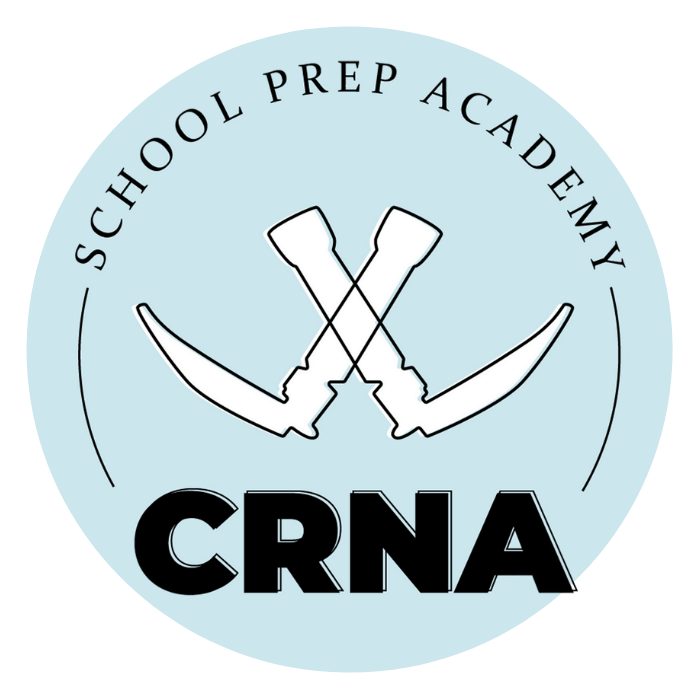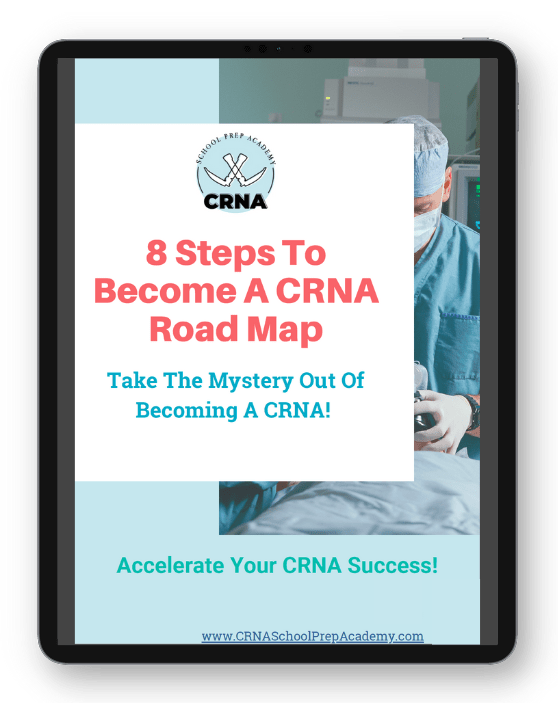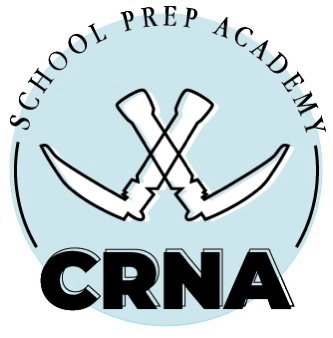
Being a CRNA sure sounds like the dream, but how can you actually get there? In this episode, our host Jenny Finnell walks you through the process of mapping out your CRNA journey in five steps! Jenny shares the five key areas she has identified to be critical in your time spent planning for CRNA, with about 10 to 11 categories to deep dive into. Jenny also touches on the character and behavior development needed for this journey. Take advantage of this opportunity! It’s never too early or late to start preparing for your career as a CRNA. Tune in now!
Get access to planning tools, mock interviews, valuable CRNA Faculty guidance, and mapped-out courses that have been proven to accelerate your CRNA success! Become a member of CRNA School Prep Academy here! https://www.crnaschoolprepacademy.com/join
Book a mock interview, personal statement critique, resume review and more at https://www.TeachRN.com
Join the CSPA email list here! https://www.cspaedu.com/podcast-email
Send Jenny an email or make a podcast request!
Hello@CRNASchoolPrepAcademy.com
—
Watch the episode here
Listen to the podcast here
Become A CRNA In 5 Steps
How do you plan your CRNA journey in just five steps? In this episode, I’m going to take you through five steps to make your CRNA journey a success. Let’s go ahead and dive in.
—
In this episode, we’re going to discuss how to map out your CRNA journey in just five steps. I am producing a course called Nursing School to CRNA Accelerator, which is designed to allow nurses who are in pursuit of CRNA to be successful as quickly as possible. Through my time mentoring thousands of students, I have identified five key areas that are critical in your time spent planning for CRNA. Within these 5 steps, there are essentially about 10 to 11 categories that we would need to deep dive into.
If you’re a CRNA School Prep Academy student, we have released our Nursing School to CRNA Accelerator course. It is available for you to read. Go under the Planning Phase in your membership and you will find the course listed there. In this episode, I’m going to cover the five steps and give you a brief, broad overview of some of the things that you can start doing to begin implementing some of the changes so that you find success sooner than later.
Let’s get started. This is meant to start as soon as you think CRNA might be for you. My hope is that you’re finding this as early on in your nursing journey. Maybe you’re a nursing student or maybe in high school. That’s amazing if you’re in high school because the sooner, the better. If you’re like, “I’m already working as a nurse,” that’s okay, too!
Step 1: Research Your School
I find that the sooner you start doing some of these steps, the better you’re going to be able to avoid potential setbacks and hopefully not face as many hurdles along the way. The number one step is to deep dive into researching your school. Some of the common statements I hear from students around this topic is, “I don’t know what school I want to apply to yet so how do I know what school to research?” It doesn’t matter. You have to start researching schools.
If you eventually decide on some schools and there was not anything that you originally researched, then you’re going to have to start the process over again. Picking 3 to 4 schools to deep dive into, even if you don’t know if you’re going to apply there, will allow you to start unlocking portals in your brain so that way you understand what the next steps need to be for you.
With all this being said, this goes into way more detail about the course. When you research your school’s requirements, there are similarities yet a lot of differences between schools, which is why essentially when I developed CRNA School Prep Academy; I did what I did because I realized not one shoe fits all. To know how to best serve you, not only do you have to understand who you are, you have to understand fully who your school is.
Not one shoe fits all. To know how to best serve you, not only do you have to understand who you are, you have to understand fully who your school is. Click To TweetWhile all CRNA schools have relatively similar requirements, they’re all equally somewhat different. Some schools place a lot of value on leadership and community involvement. Others have a very high benchmark for GPA and they have their reasons for having these differentiating factors when they look at candidates. It works for their program.
Ultimately, CRNA schools and schools in general love stats. They love to see what students pass boards and what their backgrounds are. That’s why they gear their application process towards the students who were the most successful in their program and what their backgrounds were whether that be ICU experience, GPA or leadership involvement.
Researching your school is so critical because you want to make sure that while you have the time, you are developing and tackling some of these avenues that are going to tailor yourselves so that you are a great candidate and a good fit for that program. Equally, by researching your schools early on or any schools, you’re going to unravel and find out that maybe this is not what you thought it was.
Maybe the school’s not the perfect fit for you. Maybe you go to an open house and realize the faculty doesn’t feel as warm or fuzzy as you thought it was going to be. Where there was another program where you went to the open house, you had a connection and you felt like you were going to be at home in that program. You want to feel that way and you will never know unless you meet the program faculty themselves.
I know program faculty can shift a little bit over the years but it’s important to get exposed and start by researching. I’ve dug through probably almost all the CRNA school’s websites at this point and they’re all vastly different. Some of them have incredible FAQ areas like gold, where you’re like, “This is amazing. I love this FAQ.” I nerd out over that. I get super excited when I find a thorough FAQ area on a CRNA school admissions website but not all schools have that.
Some schools, you can’t even figure out how to contact anyone. You have to hit a little button and submit your contact information on a generic page. It goes to an admissions counselor that’s not even anesthesia-related. You don’t even know who the faculty is. It’s equally very unclear. They give you generic requirements but they leave a lot of details out. You’ll see that variation when you start researching your schools.
The reason why you need to recognize these differences is that you’re going to have to see, “This school told me more than I ever thought I could know and this school didn’t tell me hardly anything.” If you just went to this one school and they barely told you anything and never went to the school that told you everything, you would think this is the norm. You’re like, “This is all I got to know. This is all. This is it.” It’s not true. It’s not all you need to know.
I want you to see the differences so you can start deep diving and understand how all schools differ and where some schools maybe fall short as far as giving out the information. That means you’re going to have to dig even further, which usually involves you reaching out to the program faculty, to the program themselves and attending open houses. Researching your school, I can’t stress it enough. I did an episode not too long ago about accelerating your CRNA success journey.
I hit this topic there too because it’s very important. Someone commented when we posted the reel on social media and they’re like, “I read this episode so I went back to my website and researched even more and found a huge thing that would’ve put me in an unqualified pile as an applicant. Had I not gone back and more thoroughly read through the admissions requirements or asked a certain question.” This is why this is so important.
I know I’ve shared this multiple times but I’ve known a student who tested out of a Math course in high school and assumed that because he tested out in high school, he didn’t take it in college even though this anesthesia program required math but he tested out. He thought he was good and it wasn’t true. He got put in a nonqualified pile of applicants because he did not have a college Math course. I see a lot of issues with courses in nursing schools. Nursing schools are so vast and they’re all very different as far as what they require. Not all nursing schools require math.
Even so, some schools require basic math. Some schools require a certain level of math and some CRNA schools require a certain level of math that maybe you wouldn’t have had. Similar to chemistry, not all CRNA schools or nursing schools require Chem 1, Chem 2 and O Chem. My nursing school required either Chem 1 and Chem 2 or Chem 1 and O Chem. I decided to take Chem 1 and O Chem.
To be honest with you, even though that worked in my favor because the school I applied to likes to see O Chem in your academic record, at the time, I didn’t know but that’s something that I wish I would’ve known. I’m glad I made the right choice but I didn’t do that because I knew. I did it because I thought O Chem would be easier. I struggled in Gen Chem and I thought, “How hard can O Chem be because it’s only a few elements?” Was I wrong you guys? That was not the right rationale.
It kicked my pants. I barely passed with a C plus and it hurt my GPA in my freshman year. Equally, that was required. For some anesthesia programs, O Chems or Biochem is required. Understanding the course requirements is huge. Some require a health assessment. Some nursing schools will lump a health assessment with a Pharm course or a Pathophys course or something odd like that. That may not fulfill the requirements of the CRNA program you’re applying to.
Equally some programs require you to have graduate-level stats out of the way before you even apply. That is something that I did research prior to my senior year in nursing school going into my senior year. I did find that out and took grad stats in my undergrad time. When I graduated, I already had that grad course out of the way. Had I not done my research, I never would’ve known that. I would’ve been working, doing the GRE, the CCRN, getting married, taking graduate-level stats and all the other things.
It made my time a little bit nicer when I was done with school because I had the flexibility of my schedule as a fifth-year senior nursing student to take that extra course. Researching your school is vital. The curriculum and the transcripts are probably the biggest things that I see hurt and hinder students from advancing. It’s very costly and time-consuming to backtrack. Research schools and know that when they make recommendations, they mean it. Do the best you can with that.

Step 2: Know Your Strengths And Weaknesses
Step number two is to know what your weaknesses and strengths are. Depending on when you’re reading this episode, you may already have some history that maybe is less than ideal. Maybe your academic record is what it is. You dealt with some things and got through them but maybe it hindered your academic record. You’re going into your CRNA journey knowing that you’re going to have some extra work to do.
Research that early on and understand how your school will view that and know that is a weakness but you can turn it into a strength. You have to always think about, “How can I take a weakness of mine and make it a strength?” I truly think that students who struggle a little bit early on tend to end up being better at managing their time and study techniques because they have to figure out how to be successful in the academic world. It’s because they didn’t do well, they were forced to figure it out.
Whereas sometimes students who are a little bit easier time taking tests and do very well academically get into the rigors of CRNA school and feel like they’ve been smacked and stomach punched in the gut. Maybe they’re good at cramming and short-term memory and that was sufficient to get through nursing school but, it’s that on steroids.
They’re falling short because maybe they didn’t truly have the best efficient study techniques, maybe they’re good studiers but they’re not efficient. The pace of CRNA school requires efficiency. Just because you’re a 4.0 does not mean CRNA school is going to be a walk in the park. I say that all the time and I said it again. Students who have a lass-than-ideal GPA record sometimes feel bad about themselves like they’re not good enough, not qualified or no one’s going to want them. That’s not the case.

You have to know how to spin that, understand what you have learned from your academic past and know what you’re doing in the future and what you’ve been doing to prevent something like that from happening. The biggest thing that programs want to know when they see iffy, dicey things in the academic past is, “What have you learned from that? What will you do to ensure that will never happen again?” If they take a chance on you and you do the same thing in their program, you’re removed and their attrition rate’s higher.
They feel bad because you weren’t successful. You wasted time and money. It’s a bad situation. They don’t want that for you. If you’re going to give them some reassurance that you’ve learned from your previous history, you have to know how to display that as a strength. Knowing that your weaknesses can become strengths is a huge thing as understanding where that is. It could be all different types of things.
I picked GPA because I feel like that’s probably the most common one that I see. Some people think it’s because they’re too old. They’re in their 40s so they think they’re past their prime and that’s not true. How can your age be a strength? You’ll hear things like CRNA schools don’t like ICU nurses who have been in practice for more than 5 or 6 years. It’s not necessarily that particular number but the reason why they have said that and it does tend to be true is not because of the number.
It’s because of, “Have you lost the ability to be a student again? Have you lost the love and the passion for learning? Can you mold and adapt? Are you willing and able to step out of your comfort zone and do new things and things that you are not used to doing and things that maybe we can critique you and say, ‘There’s a better way to do that and here’s how,’ and not get defensive about it?” Sometimes the longer you’re in a role, the harder it is to break back down again into a novice.
Sometimes, the longer you're in a role, the harder it is to break back down again into a novice. Click To TweetThey will test for that. They will screen for, “Do you get defensive when you’re wrong?” That’s the issue with being out of school for a very long time. That’s another issue. The attitude is one thing and the schooling is the other thing. “Are you going to be able to hit the ground running academically?” Sometimes the longer you’ve been out of school, let’s face it, you will be rusty.
Will you remember what it was like to juggle being a student again and working academically? Maybe now you have kids and other things that are going on that you didn’t have before. This is a brand-new experience and it’s possible. You have to reassure them and make that a strength for them. You have to know that and think through what that means for you, maybe by taking an advanced science course or a graduate-level science course and getting A’s.
Maybe you take 2 or 3 science courses to boost your GPA and update some of your core sciences and you get A’s. There you go. You’ve shown them that you are ready. Just because you may think you have a weakness does not mean that it’s not going to allow you to move forward. You have to be aware of that and make efforts to take action to achieve things that will show and display to the schools that this is the case and this is true. It’s not going to hinder you.
If you say it’s not going to happen and you don’t have proof, it’s not going to mean as much. If you verbally say, “I have a 2.8 but I promise, I’ll get straight A’s in your program,” can you see how that doesn’t pull as much weight as if you show them you can? If they can physically see evidence, they’re going to be more likely to trust and believe you like, “I believe what you say,” versus taking your word for it. That’s speaking from all walks of life.
Step 3: Get Around People Who Have Achieved What You Want To Achieve
That’s naturally how things work with life and humans. You have to prove yourself sometimes to get to where you want to go and strive for your goals. Sometimes that means failing. Sometimes that means trying and failing and trying again. Don’t be afraid to try. You’ll never know unless you try. You have to give it a shot. Step number three we’re on is, who do you know? I’m not saying because you know a program director or because you know a CRNA, you’re sure.

I’m not saying that at all. That’s not what that sentence was meant to be interpreted as but it’s about proximity. I lectured on this for our guarantee students. It’s because this is vital for any area in your life where you want to find success- getting around people who have achieved what you want to achieve, putting and surrounding yourself with others who equally want to achieve what you’re out for.
Meaning your friends and your social pool should consist of other fellow future CRNAs who are equally trying to become CRNA. I’m not saying you have to have five of them. If you develop a friendship with one other person that you know is equally striving for CRNA, that’s called proximity. That will help spur you on. You know someone who is also tackling this field.
You guys can help each other along. You can be each other’s cheerleaders. You can share information when you find it out. Similarly, by knowing CRNAs and getting to know program faculty, you’re going to be able to deep dive into this career path and understand it. It’s going to be very evident when they interview you that you truly have a good understanding of what a CRNA does.
You’re only going to gather that by putting yourself next to a CRNA by picking their brain, asking questions, going to shadowing, events or conferences. We do yearly conferences within CRNA School Prep Academy. Mark your calendar for July 15th, 2023. We’re having our virtual annual conference. We don’t have anything solidified yet. At the time I’m recording this, it’s February 2023 so put it in perspective.
We hope to have about twenty CRNA schools there in attendance to do exactly what I always preach. It’s to provide information and help guide you on what their requirements are and how you can best prepare so you’re excellent and can excel as a candidate. On July 15th, 2023 from 8:00 AM to 4:00 PM Standard Eastern Time, mark your calendar. I hope to see you there.
If you’re a CRNA School Prep Academy student, you are going to get priority pricing. If you’re an early bird, you get even better pricing than waiting to buy. We’re going to probably be sending out announcements right around this episode going live. Keep an eye out on your inbox. We will be sending those out soon. You have to put yourself around in proximity to people who have achieved what you want to achieve. It’s a good way to feel connected to the community, which I’m a big fan of.
If you think about it, when you feel connected to a community you want to belong to, you’re more likely to find success to get there. It gives you a sense of peace. You feel like you’re at home when you’ve been mentored by multiple people within a community. You feel like this is the right place for you and you want to develop that feeling. If this is going to be your lifelong career, you want to get connected to CRNAs, come to conferences and talk to CRNAs and other current SRNAs.
We equally preach that as far as connecting the current students. If you’re a CRNA School Prep Academy student, we have reached out to students in every CRNA program across the country. We have found someone who’s been through CRNA School Prep Academy for you to reach out to. We only have a small handful of schools where we don’t have an actual mentor. Connecting to a current student is so vital for your success because they’re in the thick of it. They know exactly what they’ve done to get where they are. It’s fresh in their brain.
They remember the interview process and application process. They can tell you and give you some insights as to how it’s going in school and what the programs, the faculty and the academics are like. They are gold and many of them have a huge heart for you. They want to help you. They were in your shoes once too. They remember what it was like. Similarly to me. I remember what it was like to want this so bad and want help.
Anyone who would help me, I would be willing to be like, “Please, pour into me. I need it all.” If you’re a CRNA School Prep Academy student, please take advantage of that resource. It’s on the school data sheet on the resource page. Head over there and make sure you look at the school data sheet and find a current student to connect to. That’s number three.
Step 4: Be Prepared
Number four is preparedness. It’s not a blanket statement because sometimes you can’t always be prepared. You only can know what you know and if you don’t know something, you don’t know it. You don’t know how to prepare because you didn’t know. This is something that CRNA School Prep Academy helps you with. This is why we prepare you. I call them blind spots. We try to let you know what those blind spots are so you can prepare for them.
Preparation is so important, especially for the interview process. Don’t leave yourself just a few weeks. You should be spending at least a solid month, if not, 4 to 5 months, in my humble opinion, preparing for your interview. Not like you need to do every day or all-day cram sessions for five months but working on little things to build up your understanding and critical care or knowledge so that way when you get into the interview process, you’re ready.
Think about who you are if they’re going to hit you with a heavy personal style interview. Who are you and what strengths can you bring to the program? Sometimes that takes a lot of effort to think through those things as well too. It’s pretty easy to get put down in a rabbit hole on both personal and clinical questions if you haven’t given a lot of thought to some insights on who you are, why you’re a good fit and all the other things. Start planning and preparing for that. A great way to do this is to ask a coworker to name something about you that they don’t like and do like.
Pick someone that you trust and say, “I can take it. I want some criticism. What is it that you think I struggle with that I could do better on?” Put it out there. Sometimes you’re like, “I don’t know what I’m weak about.” I guarantee that others will know. Ask someone that you trust to tell you what is a weakness of yours that they see if you’re unsure. You have to prepare. You can only do so much at one time. What I see frequently, and I wish it wasn’t the case but I see it all the time, is people put a mountain load of stuff on their plate at once and then they’re not as successful as they would’ve been had they better time managed and prepared for much longer.
For the most part, the whole year leading up to applying to CRNA school is going to be pretty heavy. You’re going to work. If it doesn’t feel heavy, you’re probably not doing enough in my opinion. You should be prepared that you’re leading up to your application by doing a lot of this stuff. I promise you, as much as I know it was tough love and hard to hear, you’re going to thank me for it later when you’re not freaking out feeling unprepared when your interview’s a few weeks away, the year leading up to your application, not when you’re applying.
Let’s say your application opens on August 1st. That means a year prior in August, you need to start preparing for your interview and thinking about all of those things and start actively taking active steps on your CRNA journey to get the leadership experience and make sure your grades and your transcripts are teed up a year before your application even opens. A year before your application even opens, you need to be taking actionable items and steps to prepare yourself for the application and interview process.
I know for a lot of you that might seem to blow your mind. That’s a long runway. Some of you are maybe even still finishing your BSN. Do what you can in that year’s time. You have to take baby steps. It doesn’t have to be big, giant things, just baby steps. It will all add up when you get to your actual application. You will have a solid year of preparation and feel a lot more ready to dive into your essay. Maybe you already have a few drafts of your essay done. That’s amazing. I don’t think you should wait until your application cycle opens to start working on your statement or your resume. All of these things should be done over the course of a year and intermittently revisited throughout that year.
Step 5: Take Action
Step number five is the simplest step. Take action. The reason why people hesitate to take action and I’m guilty of this too so that’s why I feel like I can relate to this feeling, is sometimes you see all the things you have to do. You look at all the to-dos and you’re like, “That’s a lot. I don’t even know where to start.” You then don’t start. It’s because you don’t know where to start, you don’t start or you feel overwhelmed or scared of the process.
You delay and then it gets you in a bad spot where you’re like, “I’m going to go for it but I’m not ready.” Now you have to go for it or you’re going to have to wait another whole year. You get yourself in this icky, vicious cycle. How I have combated that and how I feel like maybe you could try to approach it, is don’t focus on all the to-dos. Pick one thing that you want to get done this week and then pick one thing you want to get done this month. That’s it.
Don’t think about the thing 4, 5 or 6 months from now. You know it’s there. It’s on your vision board but you don’t actively think about it. Put it away. Tuck it. It’s going to stay. It’ll always be there. Don’t worry. It won’t go anywhere on you. It’ll sneak back up to hunt you. Focus on one thing at a time. The little tiny baby action steps that you will take will get you to where you want to go.
You have to try to learn how to take bite-size chunks out of an elephant. The more edible chunks you can take, the better. One of the best ways to achieve this is another thing that I learned. I feel like I could do that for the most part but then I still struggled to get that task item done that month or that week. I figured out why I was struggling to get those things done in the timeframe that I set for myself for one reason.
This is pretty simple too but it’s something you have to be cognizant of. I was saying yes to too much. I had to start saying no more often. “No, I can’t give you that time. I just can’t. I have to do what is my priority first. I’ll see what I can do when I can prioritize any free time.” It feels icky saying no. I’m a total people pleaser. If you are a people pleaser, I’m speaking to you because sometimes you say yes to so many other things and other people. You don’t leave anything left for yourself.
You fill other people’s cups up all the time but your cup’s empty. Keep in mind that you have to prioritize your goals over others. It feels icky but it doesn’t mean you’re saying no forever or completely. It means that the answer to that now is, “No, because I have to prioritize this.” Get creative. How can it work for both of you? One of the ways that I have found that helps work for me, like what I’m doing with CRNA School Prep Academy as much as I miss the connections I used to have with CRNA School Prep Academy students.
Sometimes, you say yes to so many other things and other people that you don't leave anything left for yourself. Click To TweetI used to have a lot more free time to do one-on-ones and talk to the students. I miss that but I can’t do it. I don’t have the time. One of the ways to combat that is to bring them on the show. It allows me to do an episode, allows me to hear from them and connect with them, which I love and enjoy. It also allows me to share it with you, the readers, which is something that I have to make a priority in my life to do.
I hope you enjoyed this episode of five simple steps. Let’s refresh and recap. 1) Research your schools. 2) Know your weaknesses and turn them into strengths. 3) Who do you know? Meaning proximity. Put yourself in proximity to people who are equally striving for the same goal or who have already achieved it. 4) Prepare. That means well in advance. Think through things as early as possible and start taking actionable steps, which is the last part. 5) Taking action. Don’t be afraid to start taking little small actions. If you get overwhelmed, think of one thing, one thing only and worry about everything else down the road. Make sure you’re saying no and setting boundaries so that you get your tasks done. I hope you enjoyed it. Take care. Until next time. I’ll see you soon. Bye-bye.
Important Links
Get access to planning tools, valuable CRNA Faculty guidance & mapped out courses that have been proven to accelerate your CRNA success! Become a member of CRNA School Prep Academy here:
https://www.crnaschoolprepacademy.com/join
Book a mock interview, personal statement critique, resume review and more at https://www.TeachRN.com
Join the CSPA email list: https://www.cspaedu.com/podcast-email
Send Jenny an email or make a podcast request!


